|
|
|
Sort Order |
|
|
|
Items / Page
|
|
|
|
|
|
|
| Srl | Item |
| 1 |
ID:
180052
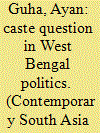

|
|
|
|
|
| Summary/Abstract |
The electoral decline of the organised Left in West Bengal politics has given rise to intellectual speculation about the increasing possibility of caste politics. In this context, this article investigates whether there is any merit in the claim that the electoral decline of the Left Front has paved the way for the rise of caste at the centre stage of mainstream electoral politics in West Bengal. It asks whether lower castes have started to mobilise politically in West Bengal in the same way as in many other states. The article argues against the claim of ‘a new politics of caste’ in West Bengal by showing that the electoral decline of the Left Front has not been accompanied by any rise in lower caste representation. In this context, the article also attempts to understand the reasons for the continuing non-politicisation of caste in West Bengal, revealing many factors relating to demography and political economy which don’t augur well for caste politics in West Bengal.
|
|
|
|
|
|
|
|
|
|
|
|
|
|
|
|
| 2 |
ID:
180055
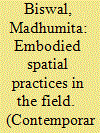

|
|
|
|
|
| Summary/Abstract |
Postmodern anthropology has used the claims of reflexivity, inter-subjectivity and recognition of differences in individual experiences in its attempt to unsettle the authority of traditional anthropology. This has led anthropologists to assert that ethnography is a cultural construct, whereby ‘fieldwork’ is conceptualised as ‘embodied spatial practice’. Drawing on village studies from India, this paper argues that the recognition of different embodied practices of ethnographers from diverse social locations has not necessarily led to the democratisation of the discipline. Conversely, insufficient engagement with hierarchical, overlapping power relations within the ethnographic field, as well as within the disciplinary establishment, has led to the standardisation of disciplinary articulations of research ethics, the terms of which privilege hegemonic groups within the discipline. The articulation of the concerns of scholars from marginalised social groups often remains difficult within such disciplinary frameworks. This paper argues that establishing a critical tradition in ethnography in the true sense requires the postmodern sensibility of recognition of the differences in experiences, supplemented with feminist and subaltern critical interrogations of power and knowledge.
|
|
|
|
|
|
|
|
|
|
|
|
|
|
|
|
| 3 |
ID:
180059
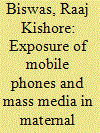

|
|
|
|
|
| Summary/Abstract |
Communications through mobile phones and mass media have shown to be useful for health promotion activities in developing nations. This study explored the potential association of mothers’ mobile phone ownership and mass media exposure on maternal health care services in a developing nation setting: urban Bangladesh. The Urban Health Survey 2013 was examined for antenatal care, delivery assistance, and postnatal care of both mothers and children through multiple regression models, adjusting for sociodemographic factors. Among 8987 ever-married female respondents, 64.1% owned mobile phones and 88% were exposed to mass media (TV, radio or newspaper) at least once a week. Mobile phone ownership was associated with a 48% greater likelihood of access to antenatal care, 34% greater delivery assistance and 31% greater postnatal care of the mother, but no differences were found for postnatal care of children. Similarly, frequent media exposure was associated with increased access to antenatal care (38%) and delivery assistance (46%), but not associated with postnatal care of mothers or children. The results suggested that mobile phones and mass media could be valid avenues for promoting access to maternal health services, and thus, support for mobile phone access and investment in awareness campaigns targeting relevant communities are worthwhile
|
|
|
|
|
|
|
|
|
|
|
|
|
|
|
|
| 4 |
ID:
180056
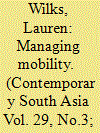

|
|
|
|
|
| Summary/Abstract |
Drawing on ethnographic fieldwork in Kolkata and rural West Bengal and engaging with literature on mobile phones in the global South, and on gender and sexuality in India, this article seeks to understand the incongruence between widespread mobile phone use in India and commuting domestic workers’ own accounts of their mobile phone use. It illustrates the important role that mobile phones play in enabling commuting workers (who are mostly women) to find work and manage relationships, but also how commuting workers play down their mobile phone use, guarding against suspicion from husbands, sons, and others. Such suspicion reflects the stigma around women’s mobility/sexuality, connected to ideas about women’s ‘honour’ and the perceived risks associated with women’s work and journeys. When workers’ mobile phone use is, then, perceived to be ‘inappropriate’, or if workers transgress norms and expectations relating to ideas about women’s ‘honour’ in other ways, they can face (further) surveillance and abuse, their access to phones thereafter often being controlled by men. Contributing to gendered analyses of mobile phones in the global South, the article shows how phones can at once create new possibilities and freedoms for commuting domestic workers while at the same time reinforcing gendered power relationships.
|
|
|
|
|
|
|
|
|
|
|
|
|
|
|
|
| 5 |
ID:
180046
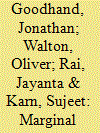

|
|
|
|
|
| Summary/Abstract |
In post-war transitions, how do centre-periphery relations change, and what is the role of actors at the margins of the state in negotiating these changes? This article explores these questions by examining Nepal’s post-war transition following the 2006 Comprehensive Peace Agreement focusing on three borderland districts (Saptari, Bardiya and Dolpa). The article analyses contrasting dynamics in these districts to highlight changes in centre-periphery relations across several areas including state reform, the economy, and transitional justice. The analysis shows how post-war transitions often generate new forms of contentious politics, and how groups at the margins can push back against emerging political settlements to reshape politics at the centre. The ambiguities and contradictions inherent to these processes are explored, with state restructuring processes susceptible to elite capture, and re-balancing of power between centre and periphery also coinciding with continuing or increased divisions and inequalities within borderland regions.
|
|
|
|
|
|
|
|
|
|
|
|
|
|
|
|
| 6 |
ID:
180057


|
|
|
|
|
| Summary/Abstract |
This article presents ethnographic accounts of the mobile phone mediated experiences of connection and intimacy among young low-income women in Dhaka, Bangladesh. It argues that mobile phones are a ‘pathway to empowerment’ insofar as the ever-evolving social practices of ‘wrong-number friendships’, long-distance courtship, and the management and manipulation of new contacts on mobile phones broaden the range of social interactions, enable expressions of aspirational mobility, and contribute to the evolution of a sense of self. It also explores how the affective power of mobile phone communication in intimate relationships alters perceptions of distance and creates forms of ‘immobile mobility’. Thus, this article builds on research that argues that the material affordances of a mobile phone challenge social and cultural gender norms and power dynamics. Moreover, by drawing out how mobility, gender and class intersect with the social and emotional experiences of low-income women in Bangladesh, it goes beyond existing literature and offers a more nuanced perspective on the notion that access to technology among marginalised and disempowered groups leads to poverty alleviation and greater equality.
|
|
|
|
|
|
|
|
|
|
|
|
|
|
|
|
| 7 |
ID:
180060
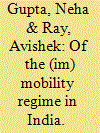

|
|
|
|
|
| Summary/Abstract |
In this paper, we examine how the Indian welfare-capitalist state, in responding to the pandemic in diverse ways, has appealed to the ‘guilt conscience’ and played on the vexed positionality of the mobile elite, who following the pandemic, have to give up their freedom of mobility. We argue that the very condition of political legibility of the mobile subject is predicated upon the ethico-moral ideal of the ‘good citizen’, who, in the statist imagination, ought to not only feel guilty but also compromise their civil liberties in questions of mobility. Under this quasi-medical dispensation, all mobilities become transgressive acts, while the implementation of the prevailing immobility regime depends more on the good citizen’s ethico-moral imperative than any discourses of legality or pathology.
|
|
|
|
|
|
|
|
|
|
|
|
|
|
|
|
| 8 |
ID:
180051


|
|
|
|
|
| Summary/Abstract |
The China–Pakistan Economic Corridor (CPEC) announced in 2015, is a $60 billion package of Chinese-led investment in roads, railways, energy, and industry. It is part of China’s new Eurasia-wide Belt and Road Initiative (BRI). The likely impact of CPEC is controversial. Some scholars argue that CPEC will generate prosperity, regional equality and rapid economic growth in Pakistan. Other scholars argue, however, that CPEC will lead to debt and to the economic and political subordination of Pakistan to China. The existing discussion of CPEC has a near exclusive inward-looking focus on Pakistan. Some scholars, mainly from outside of Pakistan, have looked in more detail at China, but principally from an international relations perspective. Missing from all of this discussion is how economic change in China, particularly in western China, will influence the likely economic outcome of the CPEC. This paper makes an effort to begin to fill this gap.
|
|
|
|
|
|
|
|
|
|
|
|
|
|
|
|
| 9 |
ID:
180054


|
|
|
|
|
| Summary/Abstract |
In India, marginalised people with serious or chronic illness face particular challenges to finding sustainable treatment, and often experience financial devastation. One state welfare scheme (the EWS hospital bed quotas) holds the promise of treatment for those in Delhi's margins, through partnerships with corporate hospitals. Yet, the process of gaining access to treatment via the scheme is very frustrating. This ethnography illustrates the ways in which low-income patients’ attempts to lay claim to state services often bring them into play with a mode of the state that is, in anthropologists’ conceptions, opaque, arbitrary and erratic. In response to the ‘illegible’ modes of access to the scheme, patients and their families are compelled to construct and reproduce their eligibility to access treatment, through a repertoire of intricate and entwined practices, namely: the attainment of credible low-income documentation, the use of big men to leverage resources, and different kinds of performance. The burden of enacting these practices is further compounded and troubled by the state scheme's blurry entanglement with the private sector, in which roles and responsibilities for a ‘duty of care’ to citizens with illness are elusive. This paper therefore aims to be an original contribution to the social sciences, in interpreting health-seekers’ experiences of state-private schemes in Delhi within anthropological understandings of the state and marginalised people's meaning-making of illegible state processes.
|
|
|
|
|
|
|
|
|
|
|
|
|
|
|
|
| 10 |
ID:
180048


|
|
|
|
|
| Summary/Abstract |
This article examines the issue of ongoing transnational tensions and disputes around land and property ownership that the members of the British-Bangladeshi diaspora are encountering in rural Sylhet, their origin region in their home country. While the existing literature on transnational communities documents migrants’ land-purchasing and house-building practices in their country of origin, too often in a celebratory way, the material disputes and tensions that arise from these investments, and their effect on transnational personal, familial and social relationships, have yet to be exposed. For British Bangladeshis, these disputes are rife and in some cases are being articulated through intimidation and even violence. My research suggests that these evolving phenomena of land and property disputes threaten to disrupt the transnational relationships that were established and maintained by one generation after another.
|
|
|
|
|
|
|
|
|
|
|
|
|
|
|
|
| 11 |
ID:
180049


|
|
|
|
|
| Summary/Abstract |
The peace and conflict literature has paid much attention to the hybridity produced by international peacebuilders and local actors. Although the modalities of hybridity have been discussed, few studies related to hybridity have observed the presence of locally led hybrid peacebuilding. To fill this gap in the literature, this paper addresses an emerging form of hybridization that is distinct from the internationally led type by examining the case of Sri Lanka. The paper takes a new direction by investigating the peace practices of local agents, referred to as grama niladharis (GNs), which has caused changes in the behavior of international actors in liberal peacebuilding in Sri Lanka. An anthropological method is applied with in-depth interviews and participatory observation. The paper identifies a critical direction for the discourse by documenting a form of locally led hybridization in which the GN system, with ownership by the local government, incorporates certain liberal peacebuilding concepts. Through this hybridization, local systems appear to reinterpret the liberal peace practices introduced by international peacebuilders in a modified form of peacebuilding and maintain autonomous local operations.
|
|
|
|
|
|
|
|
|
|
|
|
|
|
|
|
|
|
|
|
|